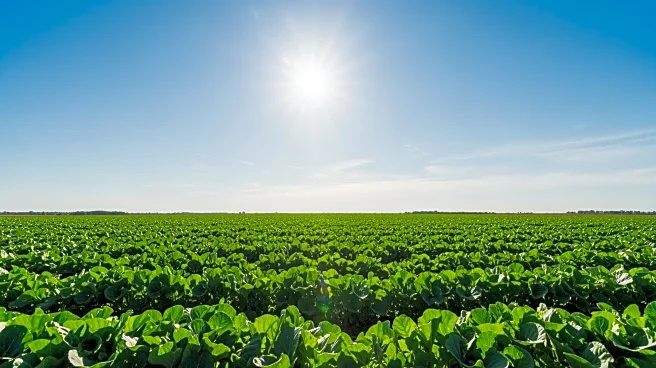What's Happening?
The Mexican Institute of Water Technology (IMTA) has revealed that agriculture accounts for approximately 76% of the national water volume allocated in Mexico. This information was shared by Waldo Ojeda, deputy coordinator of Water and Food at IMTA, during
a workshop organized by the Ministry of Environment and Natural Resources (Semarnat). The data challenges the common belief that sectors like mining and industry are the largest consumers of water resources. The findings are based on the Public Registry of Water Rights (REPDA) and the Irrigation Water Use Information System (SISUAR), which provide detailed insights into water usage across the country. Mexico's agricultural system includes 87 irrigation districts and 50,000 additional irrigation units, covering over 7.3 million hectares and serving nearly 700,000 producers. The government plans to invest over 60 billion pesos in irrigation technology by 2030 to enhance water efficiency and recover water for human consumption.
Why It's Important?
The dominance of agriculture in water usage has significant implications for Mexico's water management and food production. With agriculture consuming the majority of water resources, efficient water management becomes crucial to ensure sustainability and food security. The government's investment in irrigation technology aims to improve water efficiency, which currently stands at 40%, meaning only four out of ten drops of water reach crop roots. Enhancing irrigation efficiency could lead to better resource management and increased agricultural productivity. This focus on agriculture is vital for national water security and supports the country's efforts to modernize its infrastructure and optimize water use.
What's Next?
The Mexican government is set to invest heavily in modernizing irrigation infrastructure, with plans to recover 2.8 billion cubic meters of water for human consumption by 2030. This initiative is part of the presidential program 'Mexico becomes more technical,' which targets the modernization of 17 priority districts and nearly 220,000 hectares. The IMTA's efforts in technological advancements and data systems aim to provide transparent and verifiable information on water usage, supporting more equitable and sustainable management. However, challenges remain in standardizing and updating information from various agencies and states, which will be crucial for effective implementation of these plans.
Beyond the Headlines
The focus on agricultural water use highlights broader issues of resource management and sustainability in Mexico. The reliance on surface water sources and the need for improved irrigation efficiency underscore the importance of technological advancements in water management. The IMTA's efforts to provide accurate data and support decision-making processes are essential for addressing these challenges. Additionally, the integration of data from different sources and the unification of crop catalogs are necessary steps to ensure comprehensive and effective water management strategies.

















